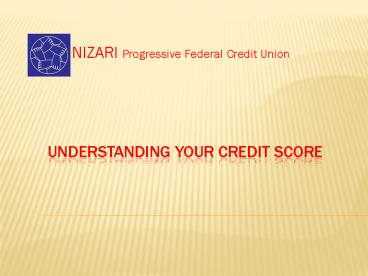Understanding Your Credit Score - PowerPoint PPT Presentation
1 / 23
Title:
Understanding Your Credit Score
Description:
Understanding Your Credit Score. NIZARI Progressive Federal Credit Union. What is a credit score? Financial ... Review your account statements every month. – PowerPoint PPT presentation
Number of Views:560
Avg rating:3.0/5.0
Title: Understanding Your Credit Score
1
Understanding Your Credit Score
-
NIZARI Progressive
Federal Credit Union
2
What is a credit score? v Financial payment
profile v Fair Isaac Corporation (FICO) v 300
to 850 the higher, the better
3
National distribution of FICO scores
4
What a low score could cost you? v Tens of
thousands of dollars in additional interest
over your lifetime v Thousands of dollars in
insurance premiums v Employment
opportunities v Purchasing power
5
What goes into your credit score?
6
Payment history 35
v Payments made on accounts with scheduled
payments (loans, mortgages, credit cards,
retail store credit etc.) v Public records
(bankruptcy, court-ordered payments, liens,
collections etc.) v Overdue accounts v
Number of past due items v Number of accounts
paid
7
Amounts owed 30 v Total amount owed v
Number of accounts you owe on v Percentage of
available credit you are using v Percentage of
payments left on loans
8
Credit history 15 v How long ago accounts
were opened v When you last used the accounts
9
New credit 10 v Number of accounts opened
recently v Number of recent hard credit
inquiries v When last hard credit inquiry
occurred v How long ago any past payment
problems occurred
10
Credit types 10 v How many different types
of credit you use how deep is your credit
experience
11
What doesnt affect your credit score v
Demographics (ethnicity, religion, age, gender,
marital status, salary, occupation,
employment history) v Interest rates you are
paying v Credit counseling services v Soft
inquiries v Hard inquiries older than 24 months
12
Common misconceptions v Paying off a bad debt
will make it go away v Credit cards must be
completely paid off to get a good score v
Credit counseling hurts your score v Shopping
rates can hurt your credit score v Frequently
checking your credit report can lower your
score v Closing old accounts helps your score
13
Who determines your credit score?
v Three national credit bureaus
Equifax Experian Trans Union v
In addition to collecting publicly available
information, creditors feed information to
one or more of these bureaus
14
Your credit report
v Personal identification Name and
current address Social security number
Employment v Financial Accounts a.k.a.
Trade Lines Open and closed
Individual and joint
? Status of
account
Delinquencies
v Credit
inquiries in last 24 months
v Public record and collection
information
Credit Report
15
Who uses credit scores and reports? v
Financial institutions v Retail stores v
Utility companies v Landlords v Insurance
companies v Employers
16
Credit bureaus have very little obligation to you
PAY TO REPORT INFORMATION
CREDIT BUREAUS
CREDITORS
PAY TO RECEIVE REPORTS
PROVIDE 1 FREE REPORT PER YEAR
PAY FOR MAILING LISTS
RESPOND TO REQUESTS FOR CORRECTION
OTHER COMPANIES
YOU
17
Among your rights . . . v One free credit
report per year from each of the three
national credit bureaus www.annualcreditreport.com
v Access to your credit report can be
frozen at no cost if you are a victim of
fraud v A free copy of your credit report
from the financial institution that denies
your application v You can opt out of
pre-approved credit offers at
www.optoutprescreen.com v A dispute or
request for correction of a mistake will
receive a timely investigation and response
18
How mistakes can happen v You have changed
your name v You have a common name v You
move frequently v Billing errors on accounts
arent reported as resolved v Spouses
accounts assumed joint v Human error in data
entry
19
Small mistakes that could mean bigger
problems v Personal identification
information is incorrect v Employment history
includes a company where you never worked v
Accounts are listed more than once v There is
a hard inquiry from a company you did not submit
an application to v An account is
missing
20
How to report mistakes EQUIFAX 1-866-238-8067 Equ
ifax Disputes P.O. Box 740256 Atlanta, GA
30374-0256 TRANSUNION 1-800-916-8800 TransUnion
Disputes 2 Baldwin Place, P.O. BOX 1000 Chester,
PA 19022 http//www.transunion.com/corporate/perso
nal/creditDisputes.page EXPERIAN https//www.expe
rian.com/consumer/cac/InvalidateSession.do?codeD
ISPUTE
21
How bad is bad?
FICO Score APR Monthly Payment Total Interest Paid
720 -850 5.000 377 2,645
690 - 719 6.947 396 3,731
660 - 689 8.000 406 4,332
625 - 659 10.559 430 5,828
590 - 624 13.856 464 7,832
500 - 589 15.364 480 8,778
20,000 car loan over 60 months
22
Improving your credit score
DO
DONT
v Pay down your debt v Be selective about
co-signing v Pay bills on time v Seek
credit counseling if youre in too deep
v Call creditors BEFORE they Call
you
v Close accounts v Lower your credit
limits v Open a lot of new accounts
23
Knowledge is power! v Start building a
credit history if you havent already v
Order a free credit report every 4 to 6 months
(www.annualcreditreport.com) v Ask your
financial institution if they provide credit
report reviews v Work on paying down debt but
dont close accounts v Review your account
statements every month































